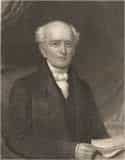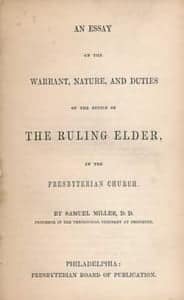This Day in Presbyterian History :
The Important Ministry of Ruling Elders
 With a lineage from the Mayflower, Samuel Miller was born in 1769. Reared in a family of nine, in the home of a minister, he was home schooled and eventually studied at the University of Pennsylvania. After prayer and fasting, he decided to enter the Christian ministry. With his minister father, his home schooling in theology was a natural arrangement, and he was soon ordained to be a Presbyterian minister. Serving as the pastor of a New York city congregation, he became convinced of the need to ordain ruling elders just as the church had long ordained teaching elders.
With a lineage from the Mayflower, Samuel Miller was born in 1769. Reared in a family of nine, in the home of a minister, he was home schooled and eventually studied at the University of Pennsylvania. After prayer and fasting, he decided to enter the Christian ministry. With his minister father, his home schooling in theology was a natural arrangement, and he was soon ordained to be a Presbyterian minister. Serving as the pastor of a New York city congregation, he became convinced of the need to ordain ruling elders just as the church had long ordained teaching elders.
On January 10, 1809, he presided over the first ordination of ruling elders in a congregation in New Jersey. That same year, he preached a sermon on “The Divine Appointment, the Duties, and the Qualifications of Ruling Elders.” This theme eventually became a book in 1831. This fundamental conviction was communicated to countless students when Samuel Miller was appointed to be the second professor at Princeton Theological Seminary in 1813. Hear him as he enunciates his position:
 “And as the members of the church session, whether assembled in their judicial capacity or not, are the pastor’s counselors and colleagues in all matters relating to the spiritual rule of the church, so it is their official duty to encourage, sustain, and defend him in the faithful discharge of his duty. It is deplorable when a minister is assailed for his fidelity by the profane and the worldly, if any portion of the eldership either takes part against him, or shrinks from his active and determined offense. It is not meant, of course, that they are to consider themselves bound to sustain him in everything he may say or do, whether right or wrong, but that, when they believe him to be faithful, both to truth and duty, they should feel it is their duty to stand by him, to shield him from the arrows of the wicked, and to encourage him as far as he obeys Christ.”
“And as the members of the church session, whether assembled in their judicial capacity or not, are the pastor’s counselors and colleagues in all matters relating to the spiritual rule of the church, so it is their official duty to encourage, sustain, and defend him in the faithful discharge of his duty. It is deplorable when a minister is assailed for his fidelity by the profane and the worldly, if any portion of the eldership either takes part against him, or shrinks from his active and determined offense. It is not meant, of course, that they are to consider themselves bound to sustain him in everything he may say or do, whether right or wrong, but that, when they believe him to be faithful, both to truth and duty, they should feel it is their duty to stand by him, to shield him from the arrows of the wicked, and to encourage him as far as he obeys Christ.”
[« Title page of Miller’s work on the ruling elder, as it appeared in an 1832 reprint.]
Words to Live By: “It is the elder’s official duty to encourage, sustain, and defend (the teaching elder) in the faithful discharge of his duty.” – Samuel Miller
Through the Scriptures: Genesis 30 – 32
Through the Standards: General providence in preserving Scripture
WCF 1:8
“The Old Testament in Hebrew (which was the native language of the people of God of old), and the New Testament in Greek (which, at the time of the writing of it, was most generally known to the nations), being immediately inspired of God, and, by His singular care and providence, kept pure in all ages, are therefore authentical; so as, in all controversies of religion, the Church is finally to appeal unto them. But, because these original tongues are not known to all the people of God, who have right unto, and interest in the Scriptures, and are commanded, in the fear of God, to read and search them, therefore they are to be translated into the vulgar language of every nation unto which they come, that, the Word of God dwelling plentifully in all, they may worship Him in an acceptable manner; and, through patience and comfort of the Scriptures, may have hope.”
Dr. Miller’s papers are preserved at the Department of Special Collections at the Princeton Theological Seminary. The finding aid for that collection may be viewed here. As well, the PCA Historical Center has managed to gather a modest collection of Miller’s works and the finding aid for that collection can be viewed here. Lastly, a comprehensive bibliography of the writings of Dr. Samuel Miller appeared in the first volume of The Confessional Presbyterian Journal (2005), pp. 11-42. Details on ordering that issue may be viewed here, or we will be glad to help you locate libraries holding this title.
